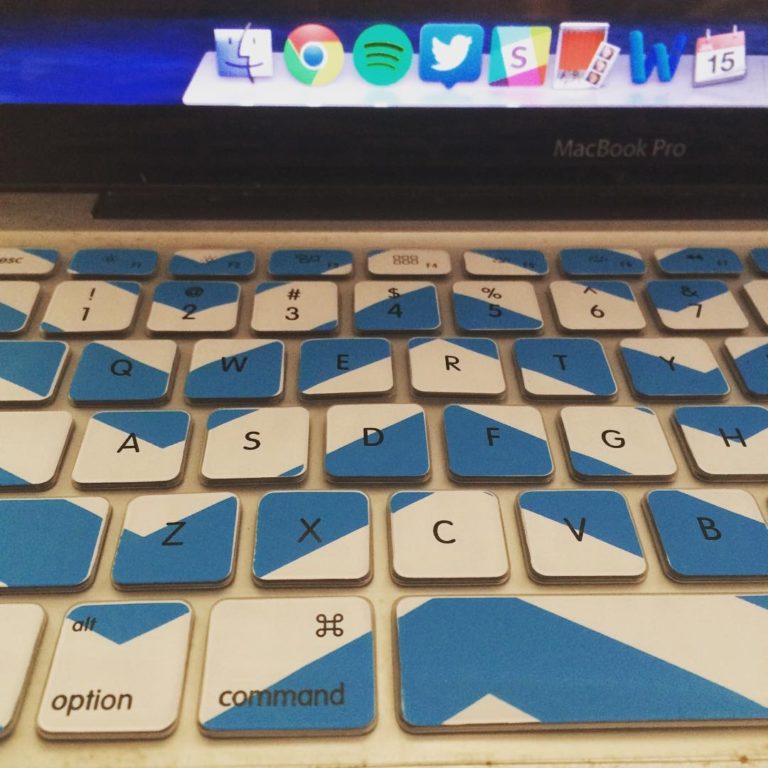
I’ve written over 130 posts on this here blog in 2017, which is… a lot. As I say to myself every time I look at my bulging folder of post drafts: “I need to chill the fuck out, man.”
That said, drilling down to choose my 11 favorite posts of the year wasn’t especially hard. These are the posts I loved working on the most, the ones that got the biggest and best reactions from my lovely readers (dat’s you!), the ones that left me feeling proudest of my craft. I hope you liked ’em too.
Just a few days into the year, I wrote “You’re Vanilla, I’m Not, But I Love You.” It poured out of me in a frantic rush. I remember one minute I was lying in bed, staring into space and pondering my current romantic predicament, and the next, I was leaping across the room to grab my notebook and scribble some notes. “Loving a vanilla person when you’re kinky,” I scrawled, and made a two-page long list of vignettes, situations, longings, fantasies, and regrets which later coalesced into a polished blog post.
Getting over a passionate love – whether that love is requited or, as in this case, decidedly not – requires action. Sometimes you have to give yourself closure, if your beloved won’t give it to you. Part of my self-closure process in recovering from this particular unrequited love was writing about it – a lot. Making sense of what happened, arranging it into a logical narrative, helped me understand why and how I had fallen so hard, and what it ultimately meant for me. Parsing out the kink piece of this puzzle in “You’re Vanilla, I’m Not” helped me with that recovery. When it was done, I breathed a sigh of sad-but-hopeful relief.
In February, I wrote about “5 Bruises I Loved and Lost.” My kinky identity is still new enough to me that I’m habitually learning new things about what makes me tick. One such piece of information I solidified for myself this year is that I love receiving bruises, bite marks, scratches, hickeys, and other visible signs of consensual affection. They remind me that I am wanted, and make me feel owned – which, for a pervy little submissive like me, is a very good feeling indeed.
In this piece, I also explored how my masochism can bleed into self-harm when depression turns my self-destructive impulse up to eleven. It’s not pretty, but it’s worth discussing. I’m still picking apart all the ways in which my kinks interact with my mental health, and writing helps me figure that stuff out.
A lot of my favorite posts I wrote this year were sponsored (yayyy, bloggers gettin’ paid for quality work!) but I think my fave sponsored post of 2017 was “Pain, Punishment, & Pretty Girls at the Ritual Chamber.” I got invited to write about a local dungeon space and brought along my pals Suz and Taylor to do a fun-as-fuck photoshoot amongst all the kinky equipment.
Beyond just making for a flashy blog post, this assignment also presented an opportunity for collaboration, something I’d like to do a lot more of in 2018. It’s so gratifying to have reached a point with this blog that I can sometimes afford to pay photographers and other collaborators, because I get to spread my good fortune around while also making rad content with talented people. Yay!
For 4/20, I penned “Submissive ‘n’ Stoned: Reflections on Weed & Kink.” I didn’t realize until I started drafting this post just how much overlap there is between those two things in my life, and I want to explore this intersection more! This post is an erotic journey through smoky basement apartments, orgasmic precipices, and unrequited love in no-smoking hotel rooms. It’s indubitably one of the sexiest things I wrote all year, but it’s also weird, which is exactly the kind of thing I love to write.
I spent a lot of time pondering and processing the notion of “daddy doms” this year, as it was the first time in over two years of DD/lg fantasizin’ that I actually had a relationship built on this dynamic. A blog post called “Are You My Daddy?” (its title a nod to the children’s book of a similar name) explored my past attempts at DD/lg dynamics and the reasons my then-partner was better-suited to that relationship style with me than my previous partners had been.
It makes me sad to re-read this piece now that that relationship has long imploded, but it’s also encouraging, because it means I’m that much closer to knowing what I want. And the more clearly you know what you want, the likelier you are to get it.
I encountered a lot of bisexual erasure this year – including people accusing me of erasing bisexuals by not using the word “bisexual” every goddamn time I mentioned a romantic or sexual dalliance. (Suffice it to say, I disagree with this perspective.) In response, I wrote “FYI: Still Bi,” a poem about biphobia and bi pride. It was fun to couch such rage in a jovial, Dr. Seuss-esque cadence. More poetry in 2018, please!
It’s always satisfying when I finally write about an idea I’ve been contemplating for a long time. “Sadsturbation: Hobby of the Heartbroken & Horny” was one such piece. I have long been someone who cries during sex, seeks orgasms for depression relief, and struggles to repopulate my fantasy life after a heartbreak. Sexuality is a great source of joy in my life, but my sadness and my sexuality are deeply linked, too.
I vividly remember a time in July when a heavy workload led to a heavy heart, and my then-boyfriend asked me, “What do you need?” The answer, honestly, was orgasms. So he gave me two of them, sweetly and domineeringly, in my cozy bed. Afterward, as the clouds cleared from my mind, he asked me, “Do you feel better?” and holy wow, did I ever.
I love writing how-to content that’s helpful not only to my readers but also to me. One such post was “How Meta-Communication Can Make You a Great Flirt (Even If You’re Shy).” It’s full of tips for earnest flirting using the subtle arts of self-awareness, self-reference, and self-disclosure. I still refer back to this post on occasion when I’m at a loss for how to flirt with someone new!
Sex toy reviews rarely make it onto this list, because frankly, I don’t consider them my best writing. I’d rather delve deeply into an emotional snafu or a philosophical argument than try to wax poetic over the specs of a toy. But this year I reviewed the Stockroom Cocksucker’s Mirror and it instantly became one of my favorite reviews I’ve ever written. What intrigued me about this toy was how it forced me to confront some deeply-rooted sexual anxieties, and that’s mostly what the review is about. It’s amazing how kink can be not only a fun sexual adventure but also a startling mirror into your psyche – in this case, literally.
I’d like to write more reviews like this in 2018: reviews that detail my personal experience with a product, from an emotional and psychological perspective just as much as a physical one. There are only so many vibrator reviews you can write (or read) before they become deathly boring. I wanna punch ’em up a bit.
My favorite blog posts of other people’s are typically the ones that blend white-hot sexiness with authentic emotion (Girl on the Net does this particularly well). I tried to do that with “5 Times Kink Helped Me Love My Body,” a meditation on insecurities, confidence, and BDSM. As it turns out, this post is a pretty spot-on microcosm of the kind of year I had sexually: one of kink and burgeoning confidence. (That’s a very good thing.)
Possibly my favorite blog post of the year was “Devastated & Divine: A Week in Post-Breakup Fashion.” I got the idea while out with my friend Suz the night after a breakup that totally wrecked me. As the two of us stood in an alley behind a liquor store, smoking weed (one of the few things that eased my bone-deep emotional pain at that time), Suz snapped some photos of me. She sent me the finished products and I mused, “These look like street fashion shots.” And then – lightbulb! aha! – an idea was born. I wrote a satirical fashion editorial about the “outfits” I wore in the week following my breakup, which ranged from “real clothes like an actual functional human would wear” to “the comfiest possible loungewear for a multi-hour cry-a-thon.”
I worked on this piece a little each day in the week following that breakup, writing only a few paragraphs every day but never skipping it, because it became an important ritual to me then. One thing that’s always been true for me is that creativity eases my pain. Writing something evocative, whether it’s a blog post or a song, reminds me of my talents and my accomplishments at times when those things are easy to forget. It would take me months after that breakup to really rediscover the sensation of happiness, but working on that blog post lifted my spirits just enough that I could get through the week. And then the week after that. And the week after that.
One dorkily earnest note before I close out this post: Thank you so much for reading my work this year. It is a daily blessing to have people out there giving a shit about the things I write. You make my life a thousand times brighter and more meaningful just by being here. Thank you, thank you, thank you. If you liked what you read here this year, I hope to write more things that give you comfort and solace in 2018 and beyond. 💜
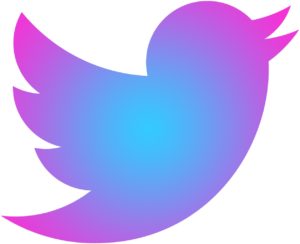 I’ve been a sex blogger for almost six years, and here’s what I know about social media: it can make or break you, both professionally and personally. I’ve built my audience through smart usage of Twitter, Instagram, and the like, but a good social media presence has also brought many additional blessings upon me: editors at big publications have discovered me through my social feeds, I’ve been offered jobs and gigs because of my tweets, and I’ve even met several partners (past and present) on Twitter. Isn’t the internet wild?!
I’ve been a sex blogger for almost six years, and here’s what I know about social media: it can make or break you, both professionally and personally. I’ve built my audience through smart usage of Twitter, Instagram, and the like, but a good social media presence has also brought many additional blessings upon me: editors at big publications have discovered me through my social feeds, I’ve been offered jobs and gigs because of my tweets, and I’ve even met several partners (past and present) on Twitter. Isn’t the internet wild?!

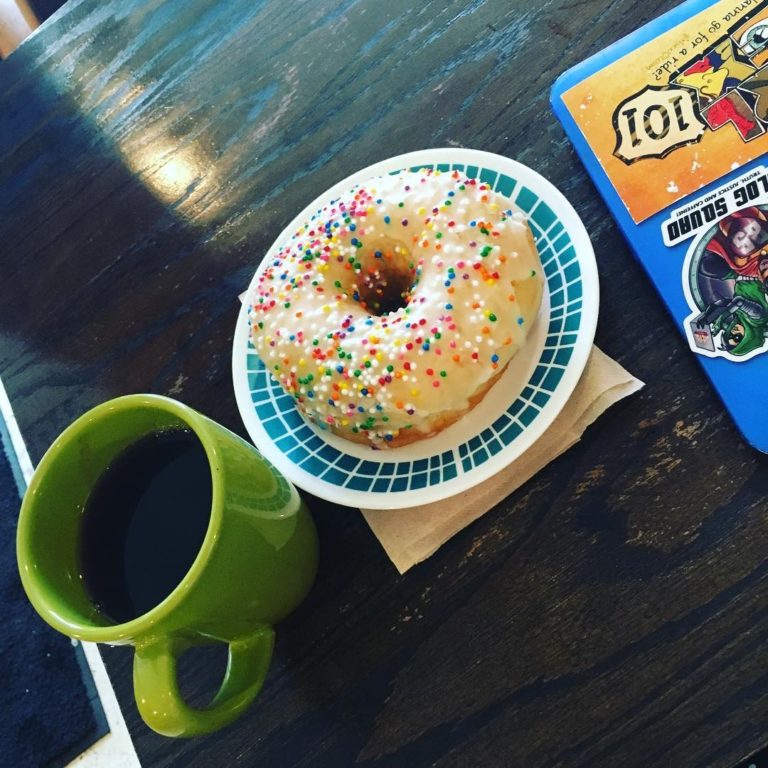
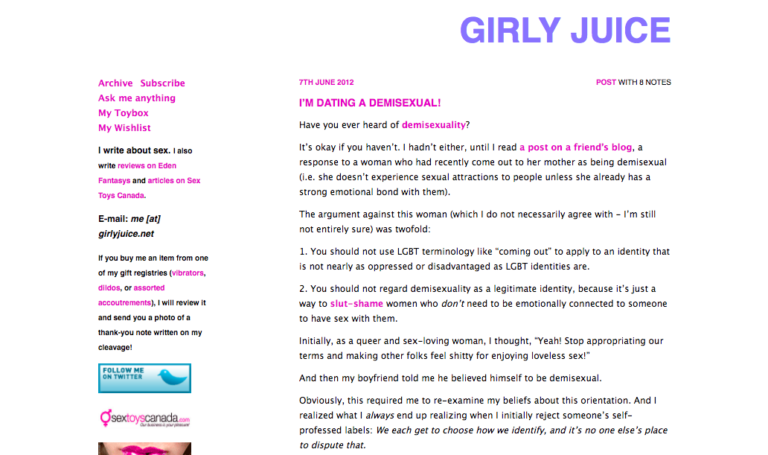
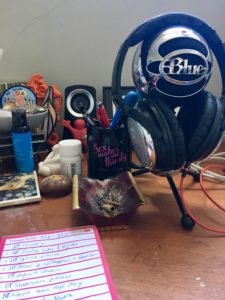 Q. How many hours go into daily blog work? Do you count sexcapades as part of your work, or are they just fun and you write about some of them?
Q. How many hours go into daily blog work? Do you count sexcapades as part of your work, or are they just fun and you write about some of them?